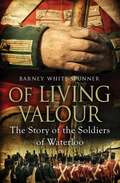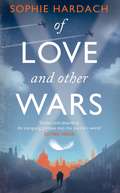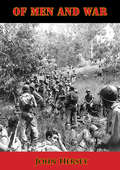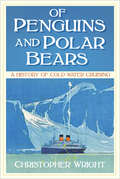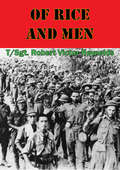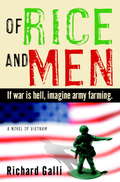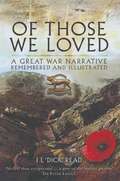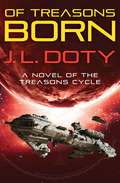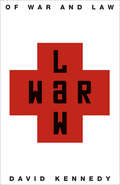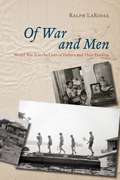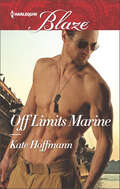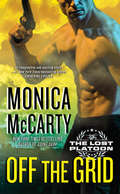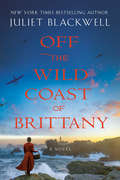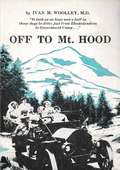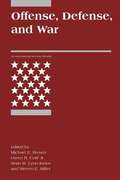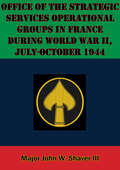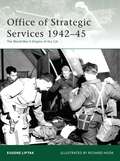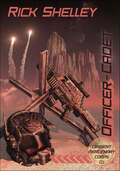- Table View
- List View
Of Living Valour
by Barney White-SpunnerPublishing to coincide with the 200th anniversary of the Battle of Waterloo, for the first time a modern British history tells the story of the against-the-odds triumph through the accounts of the regimental officers and soldiers whose bravery and resolution achieved victory. The author has used many unpublished sources, letters and diaries of ordinary British soldiers, in the vein of Stephen Ambrose's highly successful Band of Brothers.. With a concise, fast-moving account covering, ex-Commander of the British Army Barney White-Spunner tells the story through the experiences of those who fought there and their families, offering his unique perspective on the events. The story focuses on mens' personal feelings and their relationships, with each other, their families, their leaders and their enemies. It tells the stories of their lives, what they had left behind and why and what they went back to. It vividly captures their daily routine, their life in camp and how they fought at first hand, their fear, excitement and exhaustion. The Battle of Waterloo was one of the most significant ever fought by a British army, but it was also one of the most bloody with about 50,000 men losing their lives over three days. What was it like for those who fought and for their families waiting at home? This is their story.
Of Love and Other Wars
by Sophie HardachLondon, 1937. The profoundly moving story of a Quaker family and a Jewish family in love and at war during WWII. At a rally in the Royal Albert Hall, two Quaker brothers, Paul and Charlie Lamb, sign a pledge of peace that only one of them will honour. Meanwhile, in a draughty Victorian mansion in Hampstead, Mr. Morningstar wonders why his wife, a crystallographer from dynasty of diamond cutters, turns into a cursing somnambulist at night, while their daughter, Miriam, comes home from her shifts at the munitions factory with her stockings inside out. As the streets throng with khaki, the Lambs and the Morningstars must decide how to do good in a world transformed by evil. Should a scientist use her skills to maximise civilian casualties? Should a Quaker stand by as millions are murdered? And is it possible to love someone if you hate their convictions? When the two families are torn apart by war, Paul is forced to choose between his conscience and the woman he loves. Of Love and Other Wars is a profoundly moving tale of faith, longing, and decisions made in the split second of silence between bullets, whose repercussions last a lifetime. With distinctive flair and dazzling creative energy, Sophie Hardach pulls us into lives upended by betrayal, violence and passion. 'Tender and absorbing. An intriguing glimpse into the pacifist's world' Esther Freud'Poignant without ever being sentimental, morally complex and deftly woven - this is a book that gets better and better with every chapter' Gavin Extence, author of The Universe versus Alex Woods
Of Men And War
by John HerseyFind out how war smells, looks, and feels to fighting men--and how courage grows from their desperate will to live.In five true stories of World War II--* Survival* The Battle of the River* Nine Men on a Four-Man Raft* Borie's Last Battle* Front Seats at Sea War--a famous war correspondent takes you aboard John F. Kennedy's doomed PT-109...into the horror of Guadalcanal...onto a death raft in the Southwest Pacific.
Of Penguins and Polar Bears: A History of Cold Water Cruising
by Christopher WrightPeople have been cruising into polar waters since the late nineteenth century, yet this activity has not been documented, other than in a couple of academic texts. Of Penguins and Polar Bears draws on the experience and resources of experts in the field to describe where people went, the ships they cruised on, the places they visited and the itineraries they followed. Encompassing the Arctic Passages, the Canadian Artic, Greenland, Iceland, Svalbard and the Antarctic regions, the book goes also reveals what the modern-day visitor to the polar regions can expect to experience, from the vessels to the wildlife and beyond.
Of Pure Blood
by Marc Hillel Clarissa Henry Eric MossbacherWe spent nearly three years tracking down every available source about the Lebensborn organization. We had heard of the human stud-farms created by Heinrich Himmler during the Second World War; we knew that they were called Lebensborns.
Of Rice And Men [Illustrated Edition]
by T/Sgt. Robert Victor ReynoldsIncludes The Prisoners Of War In Japanese Hands During World War Two pack with 130 photos, plans and photos.This is the harrowing prisoner of war tale of T/Sgt. Bob Reynolds, who was based Del Carmen airfield in the Philippines when the Second World War broke out. Overrun like many of his fellow Americans by the invading Japanese army, his hellish existence carried him through the Bataan Death March and prison camps in Cabanatuan and Lipa. He tells his amazing story vividly and telling details of the human suffering inflicted on his comrades and the native Filipinos."In the following pages, I have endeavored to delineate that period which, from a viewpoint of National pride, is perhaps one of the darkest periods of humiliation in the history of our United States--the years of Japanese captivity of American troops from the fall of Bataan to V-J Day.The experiences narrated in the following chapters are mine alone. Encounters of other prisoners not actually witnessed by me have been omitted.Having in mind the interest of readers whose loved ones may have perished on Bataan, or Corregidor, or during the appalling years of Japanese imprisonment, I have avoided using the names of all persons. The expression "Buddy," "Friend," or "Fellow" represents in respective cases someone's son, brother, husband or sweetheart from whom I have endeavored to withhold any heartbreaking particularization.Many of the instances recounted herein may appear gruesome and vulgar; but in the interest of the future of the Nation and in memory of the heroic men who did not return I believe the story should be told."-The Author's Foreword
Of Rice and Men
by Richard GalliSpreading democracy takes more than cutting-edge military hardware. Winning the hearts and minds of a troubled nation is a special mission we give to bewildered young soldiers who can’t speak the native language, don’t know the customs, can’t tell friends from enemies, and–in this wonderfully outrageous Iraq-era novel about Vietnam–wonder why they have to risk their lives spraying peanut plants, inoculating pigs, and hauling miracle rice seed for Ho Chi Minh. Brash, eye-opening, and surprisingly comic, Of Rice and Men displays the same irreverent spirit as the black-comedy classics Catch-22 and MASH–as it chronicles the American Army’s little known “Civil Affairs” soldiers who courageously roam hostile war zones, not to kill or to destroy, but to build, to feed, and to heal. Unprepared, uncertain, and naive, they find it impossible to make the skeptical population fall in love with them. But it’s thrilling to watch them try. Among the unforgettable characters: Guy Lopaca, an inept Army-trained interpreter who can barely say “I can’t speak Vietnamese” in Vietnamese, but has no trouble chatting with stray dogs and water buffalo. Guy’s friends include “Virgin Mary” Crocker, a pragmatic nurse earning a fortune spending nights with homesick soldiers; Paul Gianelli, a heroic builder of medical clinics who doesn’t want to be remembered badly, so he never goes home; and Tyler DeMudge, whose cure for every problem is a chilly martini, a patch of shade, and the theory that every bad event in life is “good training” for enduring it again. Pricelessly funny, disarming, thought-provoking, as fresh as the morning headlines, and bursting with humor, affection, and pride, Of Rice and Men is a sincere tribute to those young men and women, thrust into our hearts-and-minds wars, who try to do absolute good in a hopeless situation.
Of Smiling Peace
by Stefan HeymOf Smiling Peace is a novel about the hazards of victory, told in the human terms of liberators, liberated and oppressors. As a story it is an absorbing duel of wits and force between resourceful Bert Wolff, American Intelligence officer, and Major Ludwig von Liszt, highly placed German Staff officer. Caught up in this duel—as bait or prize, no one knew which—is the beautiful, shrewd Marguerite Fresneau, Liszt’s mistress.Between the dueling forces is the man Jules-Marie Monaitre—the cynical betrayer-collaborator, the man of Vichy who thinks he can trade “masters” as casually as mistresses. The Monaitres, the Liszts made French North Africa a wilderness of subtly hazardous intrigue.Upon entering Algiers, Wolff is sent to arrest the Nazi Armistice Commission that had been “legally” looting the colony. One man is missing, Liszt, of Franco’s staff, whom Wolff knew by reputation during his days with the Loyalists in Spain. Liszt is a Junker, contemptuous of Nazi party hacks, with German superiority and destiny deeply rooted in his blood and background. To Wolff Liszt becomes the embodiment of the enemy, martially and emotionally.
Of Those We Loved: A Narrative 1914–1919 Remembered and Illustrated
by I L ReadThe Author was among the first to respond to Kitcheners call for volunteers in 1914. He joined 8th Battalion, The Leicestershire Regiment at the outbreak of war as a Private and, within weeks, he and the Battalion were heading for Northern France with the British Expeditionary Force.In this superb memoir we see how the spirit of adventurous patriotism that carried him to war gradually turns to sober reflection as the fighting intensifies and he loses so many friends and comrades at the Battles of the Somme and the Marne.In 1917 he is commissioned into the Royal Sussex Regiment and makes a long, hazardous journey to Egypt to join his new battalion only to be recalled to take part in the Second Battle of the Marne, where his leadership and bravery win him the Croix de Guerre. Written with great modesty and insight, Dick Reads account contains a wealth of graphic descriptions of his experiences over the whole period of The Great War including the Somme 1916, Hindenburg Line, Egypt, Flanders and the Final Advance. The book is further enhanced by the inclusion of excellent drawings by the Author himself.Many memoirs will be published to commemorate the Centenary of the War to end all Wars but it can be said with confidence that Of Those We Loved is unlikely to be bettered. It makes for gripping reading both at home and as a companion onany visit to the Battlefields. Refined over the years, but retaining a rare sense of authenticity, this is a moving personal record of a survivors war and a profoundly moving epitaph for a lost generation.
Of Treasons Born (Treasons Cycle #1)
by J. L. Doty&“An excellent military SF novel, part Hornblower, part Wiggins. It had me from the first page and held on for the rest of them&” (Kevin J. Anderson, New York Times–bestselling author). As a lifer in the Imperial Navy fighting in a war that has lasted for generations, York Ballin&’s only hope for an honorable discharge is the grave. But what events led up to his reluctant enlistment? What spawned York&’s almost fanatic loyalty to his friends—and his doubts regarding the imperial uniform he once wore with such pride? York rarely recalls his childhood, which began with a mystery and ended at age eleven when he was given a harsh choice: Join the navy or face certain death on a prison asteroid. The navy has its own code of justice, but a youngster with curiosity and grit is able to rise in the ranks . . . if he&’s given a fair shot. A few rigorous years later, as a newly commissioned ensign, York is assigned to the hunter-killer ship The Fourth Horseman. But when an unexpected foe kills his superior officer and leaves the crew stranded in enemy territory, the young ensign must do whatever he can to save the ship—even if it means he&’ll be court-martialed for treason. Of Treasons Born is a novel of the Treasons Cycle; the series was written so that it can be read in any order.
Of War and Law
by David KennedyModern war is law pursued by other means. Once a bit player in military conflict, law now shapes the institutional, logistical, and physical landscape of war. At the same time, law has become a political and ethical vocabulary for marking legitimate power and justifiable death. As a result, the battlespace is as legally regulated as the rest of modern life. In Of War and Law, David Kennedy examines this important development, retelling the history of modern war and statecraft as a tale of the changing role of law and the dramatic growth of law's power. Not only a restraint and an ethical yardstick, law can also be a weapon--a strategic partner, a force multiplier, and an excuse for terrifying violence. Kennedy focuses on what can go wrong when humanitarian and military planners speak the same legal language--wrong for humanitarianism, and wrong for warfare. He argues that law has beaten ploughshares into swords while encouraging the bureaucratization of strategy and leadership. A culture of rules has eroded the experience of personal decision-making and responsibility among soldiers and statesmen alike. Kennedy urges those inside and outside the military who wish to reduce the ferocity of battle to understand the new roles--and the limits--of law. Only then will we be able to revitalize our responsibility for war.
Of War and Men: World War II in the Lives of Fathers and Their Families
by Ralph LarossaFathers in the fifties tend to be portrayed as wise and genial pipe-smokers or distant, emotionless patriarchs. This common but limited stereotype obscures the remarkable diversity of their experiences and those of their children. To uncover the real story of fatherhood during this transformative era, Ralph LaRossa takes the long view--from the attack on Pearl Harbor up to the election of John F. Kennedy--revealing the myriad ways that World War II and its aftermath shaped men. Offering compelling accounts of people both ordinary and extraordinary, Of War and Men digs deep into the terrain of fatherhood. LaRossa explores the nature and aftereffects of combat, the culture of fear during the Cold War, the ways that fear altered the lives of racial and sexual minorities, and how the civil rights movement affected families both black and white. Overturning some calcified myths, LaRossa also analyzes the impact of suburbanization on fathers and their kids, discovering that living in the suburbs often strengthened their bond. And finally, looking beyond the idealized dad enshrined in TV sitcoms, Of War and Men explores the brutal side of family life in the postwar years. LaRossa's richly researched book dismantles stereotypes while offering up a fascinating and incisive chronicle of fatherhood in all its complexity.
Off Base: A Bestselling Male/Male Military Romance (Out of Uniform #1)
by Annabeth AlbertAfter trading the barracks for a fixer-upper rental, navy SEAL Zack Nelson wants peace, not a roommate-especially not Pike, who sees things about Zack he most wants to hide. Pike's flirting puts virgin Zack on edge. And the questions Pike's arrival would spark from Zack's teammates about his own sexuality? Nope. Not going there. But Zack can't refuse. Pike Reynolds knows there won't be a warm welcome in his new home. What can he say? He's an acquired taste. But he needs this chance to get his life together. Also, teasing the uptight SEAL will be hella fun. Still, Pike has to tread carefully; he's had his fill of tourists in the past, and he can't risk his heart on another, not even one as hot, as built-and, okay, yeah, as adorable-as Zack. Living with Pike crumbles Zack's restraint and fuels his curiosity. He discovers how well they fit together in bed...in the shower...in the hallway... He needs Pike more than he could have imagined, yet he doesn't know how to be the man Pike deserves. Book One of the Out of Uniform series This book is approximately 73,000 words One-click with confidence. This title is part of the Carina Press Romance Promise: all the romance you're looking for with an HEA/HFN. It's a promise! Find out more at CarinaPress.com/RomancePromise
Off Limits Marine
by Kate HoffmannForbidden desire... Marine captain Gabe Pennington knows how to keep a secret-a little too well. He's been in love with his best buddy's wife since they met. And he can't forget the stolen, passionate kiss they once shared. But now Annie Jennings has been a widow for two years, and Gabe wants her more than ever. Except that Annie still isn't ready to say goodbye to her deceased husband. Instead, Gabe can only hope that the searing chemistry between them is enough to convince Annie to move on-and forget her promise to never again date military guys. Especially because Gabe still has one secret eating away at him. And it's a secret that could set Annie free...or destroy her faith in love forever.
Off the Grid (The Lost Platoon #2)
by Monica McCartyA hunt for dangerous secrets leads to explosive chemistry in this exhilarating romantic suspense novel from the New York Times bestselling author of Going Dark.A team of Navy SEALs go on a mission and disappear without a trace--they are The Lost Platoon. Investigative reporter Brittany Blake may have stumbled upon the story of a lifetime in her search for her missing brother. When he seemingly disappears overnight, she refuses to accept the Navy's less-than-satisfying explanation. She begins her own investigation, which leads her to top-secret SEAL teams, covert ops, and a possible cover up... John Donovan is having trouble biding his time, waiting for his Commanding Officer to figure out who set up their platoon. John's best friend and BUD/S partner, Brandon Blake, was one of the many lives tragically lost in the attack against his team. When Brandon's sister, Brittany, tracks John down, looking for answers, he realizes that she may be their best bet--or bait--for finding out who is targeting SEAL Team Nine.
Off the Wild Coast of Brittany
by Juliet BlackwellAn unforgettable story of resilience and resistance set during WWII and present-day France on a secluded island off the coast of BrittanyNatalie Morgen made a name for herself with a memoir about overcoming her harsh childhood after finding a new life in Paris. After falling in love with a classically trained chef, they moved together to his ancestral home, a tiny fishing village off the coast of Brittany.But then Francois-Xavier breaks things off with her without warning, leaving her flat broke and in the middle of renovating the guesthouse they planned to open for business. Natalie's already struggling when her sister, Alex, shows up unannounced. The sisters form an unlikely partnership to save the guesthouse, reluctantly admitting their secrets to each other as they begin to heal the scars of their shared past.But the property harbors hidden stories of its own. During World War II, every man of fighting age on the island fled to England to join the Free French forces. The women and children were left on their own...until three hundred German troops took up residence, living side-by-side with the French women on the tiny island for the next several years.When Natalie and Alex unearth an old cookbook in a hidden cupboard, they find handwritten recipes that reveal old secrets. With the help of locals, the Morgen sisters begin to unravel the relationship between Violette, a young islander whose family ran the guesthouse during WWII, and Rainier, a German military customs official with a devastating secret of his own.
Off to Mt. (Mount) Hood: An Auto Biography of the Old Road
by Ivan M. Woolley“It took us an hour and a half in those days to drive just from Rhododendron to Government Camp…”These days, if you are traveling to Mt. Hood from Portland, it is about a one and a half hour drive to reach your destination.During the early 1900s, when the first automobile trips were made to Mt. Hood, it really was an adventure, taking up to three days to get from Portland to Government Camp, a sixty-mile trek over mostly dirt (and mud) roads.Off to Mt. Hood chronicles the early days of road trips to Mt. Hood as told by Ivan M. Woolley, who was a college student at the time and would drive tourists in a 4-cylinder, 48 horse power 1907 Pierce Arrow during his summer breaks. In those days, most visitors would not drive their own vehicle on the somewhat sketchy road; they hired a driver, like Mr. Woolley. And only the adventurous even made their way to the mountain.Mr. Woolley’s autobiography is sprinkled with stories of personal experiences of Mr. Woolley and his compatriots and passengers. He shares the hardships and stories of many of the early settlers who also opened road houses in the area, including Wemme, Welches, Faubion, Tawny, McIntyre and more.
Off to War: Voices of Soldiers' Children
by Deborah EllisDeborah Ellis turns her attention to American and Canadian children whose parents are soldiers fighting -- or who have fought -- in Afghanistan and Iraq. In frank interviews, they talk about how this experience has marked and shaped their lives.
Off-Duty SEALs: Military Romantic Suspense (The Echo Platoon Series)
by Marliss MeltonFour Stories of Bachelor Navy SEALs On Dangerous Missions of the Heart in Off-Duty SEALs, An Echo Platoon Anthology by Marliss Melton--Present Day, Louisa Virginia, Virginia Beach, Spain, Washington DC--Tyler Rexall was issued a medical discharge and released from the Teams. Now he’s living in his parents’ country home wondering what the hell he’s going to do with a crushed foot, let alone with the ugly dog just foisted on him by some well-meaning woman he knew in high school.Rusty Kuzinsky has given thirty-two years to the Teams. He has big plans following retirement, but they don’t include caring for a traumatized military war dog. There’s only one woman he can rely on to help him…if she’s forgiven him for letting her husband die all those years ago.Mitch Thoreau finds romance on his vacation in Spain when Catalonia’s bid for independence turns violent. Too bad for Mitch, the woman he’s falling for is a member of the family responsible for unleashing terror on Barcelona.Stuart Rudolph, a white-hat hacker in his off-hours, is surfing the web when he realizes danger on the home front is just a click away. Imagine Stu’s horror on discovering the only woman he ever loved—and lost—is being used as bait by the terrorists who are out gunning for Stu.Publisher's Note: Gifted and experienced, no one delivers true SEAL action and romance like Marliss Melton. Sure to be enjoyed by fans of Trish McCallan, Tawny Weber and Maya Banks as well as Christin Harber, Suzanne Brockmann and Linda Howard.
Offense, Defense, and War
by Michael E. Brown Owen R. Coté Sean M. Lynn-Jones Steven E. MillerOffense-defense theory argues that the relative ease of offense and defense varies in international politics. When the offense has the advantage, military conquest becomes easier and war is more likely; the opposite is true when the defense has the advantage. The balance between offense and defense depends on geography, technology, and other factors. This theory, and the body of related theories, has generated much debate and research over the past twenty-five years. This book presents a comprehensive overview of offense-defense theory. It includes contending views on the theory and some of the most recent attempts to refine and test it.
Office Of The Strategic Services Operational Groups In France During World War II, July-October 1944
by Major John W. Shaver IIIThis study evaluates six Operational Groups which supported Allied operations in France during the period 31 July to 10 October 1944. The groups were composed of two officers and 15 enlisted men. They were trained to work behind enemy lines conducting sabotage and guerrilla activities.The conceptual developments of Operational Groups doctrine, recruitment, command and control, and training for these volunteers are first examined. The teams' missions are then examined.The study concludes the concept for Operational Groups was sound, but they were not properly employed as strategic assets, thus not exploiting their capabilities to the fullest. Problems they experienced were mission orders, intelligence, command and control, and air delivery of special operations personnel.Studying their history is useful to today's leaders and Special Forces as a means of evaluating special operations support to a theater.
Office of Strategic Services 1942-45
by Richard Hook Eugene LiptakOsprey's elite series title for the origins of the CIA during World War II (1939-1945). The Office of Strategic Services, the forerunner of the Central Intelligence Agency, was founded in 1942 by William 'Wild Bill' Donovan under the direction of President Roosevelt, who realized the need to improve intelligence during wartime. A rigorous recruitment process enlisted agents from both the armed services and civilians to produce operational groups specializing in different foreign areas including Italy, Norway, Yugoslavia and China. At its peak in 1944, the number of men and women working in the service totaled nearly 13,500.This intriguing story of the origins and development of the American espionage forces covers all of the different departments involved, with a particular emphasis on the courageous teams operating in the field. The volume is illustrated with many photographs, including images from the film director John Ford who led the OSS Photographic Unit and parachuted into Burma in 1943.
Officer of the Court
by Bill Mesce Jr.From the critically acclaimed author of The Advocate comes a new novel of military suspense featuring a hero who dares to investigate the crimes that war often hides. Officer of the Court is the stunning tale of a man defying the military establishment and risking his life to solve a murder -- a murder that conceals a shattering act of betrayal. On a remote Scottish island the body of an American officer has washed ashore. Major Harry Voss, a lawyer in the Army's Judge Advocate's office, doesn't hesitate to take the assignment of finding out who killed Lieutenant Armando Grassi, and why. Harry worked with Lieutenant Grassi on the case of a murdered American fighter pilot shot down by his own comrades. That inquiry left good men dead, a woman destroyed, and justice undone. For Harry, this is a chance to right the wrongs of the past. Meanwhile, World War II is raging: London has survived the Blitz, Nazi submarines have been swept out of the North Atlantic, and the Allies are poised for victory on the Italian front. From the beginning, Voss and his new partner, Captain Woody Kneece, are certain that Grassi had uncovered something about secret night flights between England and a remote base in Greenland. Now they must follow Grassi's footsteps. And when they do, they are drawn inexorably into a dangerous conspiracy -- and the fiery crucible of the war. There is far more to Grassi's murder than meets the eye. Harry's investigation will take him from the rear echelons to the front lines in search of the truth. But, as Harry knows, the truth is often the first casualty of war. In a world where soldiers guard their secrets with their lives and ruthless, powerful men orchestrate world events for their own gain, Harry is facing an almost impossible task. He cannot guess how much this investigation will cost him personally and professionally. But as he and Kneece, each with something to prove to himself, come closer to a shocking revelation, the more they find themselves challenging a military establishment that takes no prisoners. Here loyalties are meant to be betrayed, allies can turn easily into foes, and the line between combat and cold-blooded murder can become tragically blurred.
Officer, Nurse, Woman: The Army Nurse Corps in the Vietnam War (War/Society/Culture)
by Kara Dixon VuicWinner, 2010 Lavinia L. Dock Award, American Association for the History of NursingAn American Journal of Nursing Book of the Year in History and Public Policy"‘I never got a chance to be a girl,’ Kate O’Hare Palmer lamented, thirty-four years after her tour as an army nurse in Vietnam. Although proud of having served, she felt that the war she never understood had robbed her of her innocence and forced her to grow up too quickly. As depicted in a photograph taken late in her tour, long hours in the operating room exhausted her both physically and mentally. Her tired eyes and gaunt face reflected th e weariness she felt after treating countless patients, some dying, some maimed, all, like her, forever changed. Still, she learned to work harder and faster than she thought she could, to trust her nursing skills, and to live independently. She developed a way to balance the dangers and benefits of being a woman in the army and in the war. Only fourteen months long, her tour in Vietnam profoundly affected her life and her beliefs."Such vivid personal accounts abound in historian Kara Dixon Vuic’s compelling look at the experiences of army nurses in the Vietnam War. Drawing on more than 100 interviews, Vuic allows the nurses to tell their own captivating stories, from their reasons for joining the military to the physical and emotional demands of a horrific war and postwar debates about how to commemorate their service. Vuic also explores the gender issues that arose when a male-dominated army actively recruited and employed the services of 5,000 nurses in the midst of a growing feminist movement and a changing nursing profession. Women drawn to the army’s patriotic promise faced disturbing realities in the virtually all-male hospitals of South Vietnam. Men who joined the nurse corps ran headlong into the army's belief that women should nurse and men should fight.Officer, Nurse, Woman brings to light the nearly forgotten contributions of brave nurses who risked their lives to bring medical care to soldiers during a terrible—and divisive—war.
Officer-Cadet (Dirigent Mercenary Corps #1)
by Rick ShelleyA military academy reject seeks to prove himself among the ranks of mercenaries in this classic military science fiction action series opener.The year is 2804 AD. Humanity has colonized the universe. But the authority of the Confederation of Human Worlds is spread thin. Where the Army of planet Earth cannot reach, mercenaries must keep the peace—and the Dirigent Mercenary Corps are the best of the best.Lon Nolan wasn’t supposed to be serving with the DMC. He’d earned his place at the elite North American Military Academy, and he’d excelled there. But when he’s kicked out of the Academy on trumped-up charges, he’s left with no choice: join the DMC or go home.So join he does, going from top of his class to bottom rung in the DMC. To become an officer, he’ll have to survive his first taste of combat with his new army, and if he fails, he won’t lose just his honor, but his life . . . The Dirigent Mercenary Corps books are classics of military science fiction. Rick Shelley was himself a veteran of the U.S. Army, and his experience and knowledge shine through on every page.
